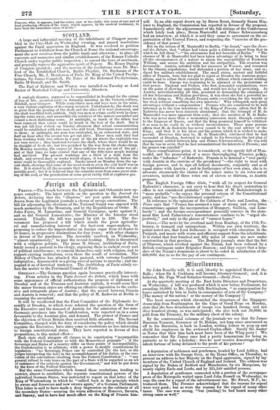SCOTLAND.
A large and influential meeting of the inhabitants of Glasgow assem- bled in the City-Hall on Wednesday evening, and passed resolutions against the Papal aggression in England. It was resolved to petition Parliament to withdraw from the Church of Rome the national encourage- ment she now receives from the public funds and otherwise ; to place all convents and nunneries and similar establishments of the Roman Catholie Church under regular public inspection ; to amend the laws of mortmain, and generally repress the aggressive spirit of Popery. Mr. Henry Dunlop of Craigton presided ; and the movers of the resolutions were Dr. Mac- leod of the Established Church, Baillie Playfair, Dr. Buchanan of the Free Church, Mr. J. Henderson of Park, Dr. King of the United Presby- terians, Sir James Campbell, Dr. Bates of the Reformed Presbyterians, Bailie M`Dowall, and Dr. Smith.
The Earl of Eglinton and Winton was installed on Tuesday as Lord Rector of Marischal College and University, Aberdeen.
A coal-pit disaster, supposed to be unparalleled in Scotland for the extent of loss of life, occurred early on Saturday morning in the Victoria colliery, Nitshill, near Glasgow. While sixty-three men and boys were in the mine, a very violent explosion of fire-damp occurred. Unfortunately, the shock was so great that the gearing of the shaft and the sides of it were destroyed, and the shaft was filled with rubbish. Only two men at a time could work in clear- ing the ruins away, and meanwhile the relatives of the miners assembled and caused a most distressing scene. At midnight, so much of the dans had been removed that voices could he heard at the foot of the shaft. But it was not till four o'clock on Sunday afternoon that actual communication could be established with two men who still lived. Provisions were conveyed to them ; at midnight, one man was extricated, in an exhausted state, and half an hour after the second was got out alive. These men said they had been working with two others in a part of the pit where the explosion was not very severe ; they hastened towards the shaft, where there would be an in-draught of fresh air; but two perished by the way from the choke-damp. On Monday morning, the corpses of these sufferers were got out of the pit ; and at that time no hope existed that any of the fifty-nine people missing had survived. The present workings are a third of a mile from the shaft, and several days or weeks would elapse, it was believed, before the mine could be thoroughly explored. Smoke issued on Monday from the up- east shaft, showing that some of the wood-work or even the coal itself was on fire. It is stated by all the accounts that the ventilation of this mine was ad- mirably good; but it is believed that the calamity arose from some great sink- ing of the roof, or the penetration of some great cavity full of explosive gas.


























 Previous page
Previous page